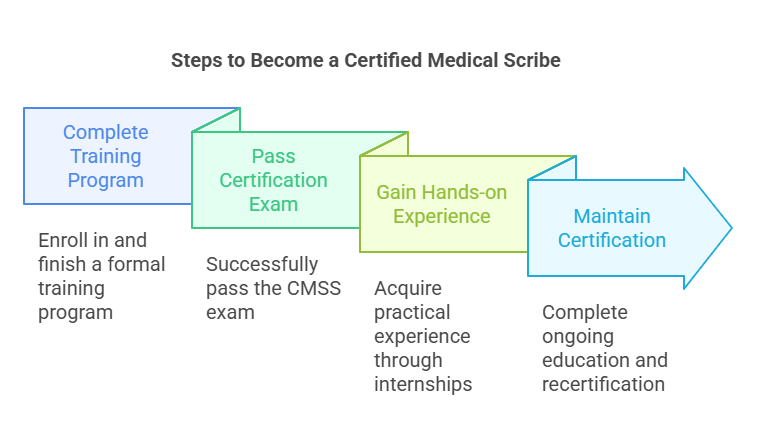Hospital vs. Clinic Medical Scribe Certification: Which One to Choose?
In today’s fast-paced healthcare environment, medical scribes play a crucial role in supporting doctors and healthcare professionals by documenting patient information. Whether in a hospital or clinic, medical scribes are essential for maintaining accurate medical records, improving patient care, and optimizing the workflow of healthcare facilities. However, when it comes to pursuing medical scribe certification, one key question arises: should you choose a hospital-based or clinic-based medical scribe certification? In this blog, we’ll dive deep into the differences, advantages, and considerations for both options, helping you make an informed decision based on your career goals.
What Is a Medical Scribe Certification?
Before we explore the differences between hospital and clinic-based medical scribe certifications, let's first define what a medical scribe certification entails. A medical scribe is a professional who assists healthcare providers by documenting patient encounters, inputting information into Electronic Health Records (EHR), and ensuring that medical notes are accurate and up-to-date.
Medical scribe certifications typically involve a structured training program that includes courses on medical terminology, clinical procedures, EHR systems, and the documentation of patient history, physical exams, diagnoses, and treatment plans. Upon completion of the program, candidates receive a certification that validates their expertise in performing these tasks efficiently and effectively.
Hospital Medical Scribe Certification
A hospital medical scribe certification is designed for individuals who aim to work in large medical facilities such as hospitals, where the pace is fast, and the medical cases are often complex. Hospitals typically handle a wide range of emergency care, specialized procedures, and high-acuity patients, making the role of a medical scribe particularly crucial.
Key Considerations:
Complex Patient Cases: Hospital scribes often work with a wide variety of patients, including those requiring emergency care, surgeries, and specialized treatments. The documentation demands are high due to the complexity of cases.
Advanced Technology: Hospitals tend to use advanced EHR systems, so medical scribes need to be proficient in handling complex software tools and may need additional training on hospital-specific systems.
Varied Specialties: Hospital settings expose medical scribes to different specialties like cardiology, orthopedics, and oncology, offering valuable experience in various medical fields.
Pros of Hospital Medical Scribe Certification:
Exposure to a broad spectrum of medical conditions and treatments.
Opportunities to work in high-stress, high-reward environments.
A chance to work closely with specialists and gain advanced medical knowledge.
Cons of Hospital Medical Scribe Certification:
High-pressure work environment.
Irregular hours due to the nature of hospital operations (i.e., night shifts, weekends).
Clinic Medical Scribe Certification
On the other hand, clinic-based medical scribe certifications cater to individuals who are interested in working in smaller, outpatient settings such as family practice offices, urgent care centers, or specialty clinics. Clinics typically focus on routine checkups, preventive care, and chronic disease management.
Key Considerations:
Routine Patient Encounters: The types of cases seen in clinics tend to be less urgent and more predictable. Scribes in this environment typically document regular medical check-ups, follow-ups, and ongoing care for chronic conditions.
Smaller Workload: Clinic medical scribes usually handle fewer patients per day, which can allow for a more manageable workload and regular hours.
Familiarity with Specific Medical Fields: Clinics often focus on specific medical areas such as pediatrics, dermatology, or internal medicine. Medical scribes in this setting may become highly specialized in these fields.
Pros of Clinic Medical Scribe Certification:
Regular work hours (day shifts).
Less stressful compared to hospitals, with fewer high-acuity patients.
A more predictable work environment.
Cons of Clinic Medical Scribe Certification:
Less exposure to a wide variety of medical cases.
Limited opportunities for advancement in highly specialized settings.
Key Differences Between Hospital and Clinic Medical Scribe Certification
To help you decide which path is best for you, it’s important to compare the two options based on several factors:
Which Medical Scribe Certification Should You Choose?
The decision between hospital and clinic medical scribe certification ultimately depends on your career goals, work preferences, and lifestyle. If you thrive in fast-paced, high-pressure environments and are eager to gain exposure to a wide variety of medical cases, a hospital-based medical scribe certification might be the right choice for you. However, if you prefer a more predictable work environment with regular hours and a focus on routine care, a clinic-based certification may be a better fit.
How to Become a Certified Medical Scribe
Regardless of whether you choose a hospital or clinic medical scribe certification, the steps to becoming certified are similar. The process generally involves:
Completing a formal training program (online or in-person) that includes both coursework and practical experience.
Passing a certification exam, such as the Certified Medical Scribe Specialist (CMSS) exam.
Gaining hands-on experience in the field, either through internships or entry-level scribe positions.
Maintaining certification by completing continuing education and recertification programs as required.
The Future of Medical Scribes in 2025
As the healthcare industry continues to evolve, medical scribes will play an increasingly important role in improving patient care and streamlining healthcare processes. By 2025, medical scribes will likely see increased demand due to the growing reliance on electronic health records, an aging population, and the expansion of telemedicine.
Hospitals and clinics alike will continue to seek highly trained medical scribes to ensure accurate documentation, reduce physician burnout, and enhance patient care. Therefore, the certification you choose should align with the future trends in the healthcare industry and your long-term career aspirations.
Lesser-Known Facts About Medical Scribe Certifications
Medical scribes help reduce physician burnout. Scribes take over the documentation, allowing physicians to focus on patient care. Source
Medical scribe certifications are recognized by multiple healthcare organizations. Many institutions, including hospitals and clinics, prefer certified scribes. Source
The role of medical scribes is growing in telemedicine. Scribes are now being used in virtual visits to help document patient information. Source
Medical scribes improve patient care and reduce wait times. By documenting efficiently, scribes help improve the overall patient experience. Source
Medical scribe programs can be completed online. Many schools offer flexible online programs for aspiring medical scribes. Source
Certified scribes earn a competitive salary. The average salary for a certified medical scribe is higher than for non-certified scribes. Source
Medical scribes help reduce healthcare costs. By improving efficiency, scribes contribute to cost savings in healthcare settings. Source
Scribes are not only limited to healthcare settings. Some legal and business professionals hire scribes for documentation. Source
Scribes may be involved in research documentation. In some settings, scribes assist with clinical trials and research studies. Source
Medical scribes must stay updated on medical terminology. They need continuous education to keep up with the latest medical practices. Source
Conclusion
Whether you pursue a hospital or clinic medical scribe certification, both paths offer exciting career opportunities in the healthcare industry. The key to making the right decision is understanding your career preferences, the work environment you thrive in, and your desire for specialized experience. At ACMSO, we offer comprehensive Medical Scribe Certifications that prepare you for a rewarding career in healthcare. Our training programs equip you with the knowledge and skills necessary to succeed in both hospital and clinic settings, ensuring you are prepared for the demands of the healthcare industry in 2025 and beyond.
FAQs
-
Hospital medical scribes work in high-stress environments with complex patient cases, while clinic scribes focus on routine care and have more predictable hours.
-
Yes, once certified, you can work in either setting, depending on your preferences and career goals.
-
A medical scribe needs strong knowledge of medical terminology, excellent typing skills, attention to detail, and proficiency in using Electronic Health Records (EHR) systems.
-
It typically takes 3-6 months to complete a training program and pass the certification exam.
-
The demand for medical scribes is expected to increase as more healthcare providers adopt electronic health records and as the healthcare industry grows.






